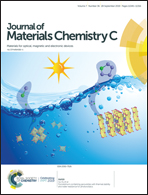A laser-fabricated nanometer-thick carbon film and its strain-engineering for achieving ultrahigh piezoresistive sensitivity†
Abstract
Conventionally, the direct laser writing carbonization (DLWc) technique can only be used for producing porous carbon structures. Herein, by selecting an appropriate substrate, such as fused quartz, with low thermal conductivity and a small thermal expansion coefficient for supporting a carbonizable polymer precursor, we report a new approach that enables the use of DLWc for fabricating dense, uniform and nanometer-thick carbon films from very thin polyimide films. The as-formed ultrathin carbon film on fused quartz could also be transferred to various flexible and stretchable polymer substrates, such as polyimide, polyvinyl alcohol and polydimethylsiloxane. With the newly developed fabrication method, a series of ultrathin carbon films with thicknesses ranging from 8–270 nm were prepared, and their chemical/physical structures, and electrical, optical and piezoresistive performances were comprehensively characterized and evaluated. It was found that the ultrathin carbon films of varying thicknesses prepared via DLWc possessed a large content of nitrogen and oxygen with disordered/defective graphitic structures. Except for the thinnest 8 nm thick carbon film, all the films with thicknesses greater than 22 nm manifested a reasonable electrical conductivity and relatively low piezoresistive sensitivity. To further enhance the piezoresistive sensitivity of the obtained carbon thin films, a strain-engineering treatment was performed to introduce nanocracks into the as-prepared thin film samples. Using this approach, a record-high gauge factor of GF > 450 000 at small strain (ε < 1.8%) was achieved for the strain-engineered ultrathin carbon thin films. Due to their ease of fabrication, nanometer thickness, mechanical robustness, patternability, transferability and ultrahigh piezoresistive sensitivity, ultrathin carbon films fabricated via DLWc have useful applications in different areas.



 Please wait while we load your content...
Please wait while we load your content...